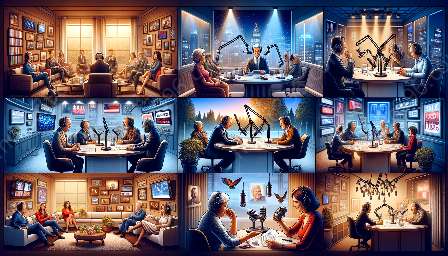Talk radio has long been recognized as a powerful driver of public opinion, especially on political and social issues. It serves as a platform for impassioned discussions and diverse perspectives, often shaping the beliefs and attitudes of its listeners. Understanding the role of talk radio in public opinion formation and its broader impact on society is essential in comprehending the dynamics of media influence.
The Power of Talk Radio
One of the most compelling aspects of talk radio is its ability to engage and mobilize a wide audience. Unlike traditional forms of media, talk radio encourages direct listener participation, enabling individuals to express their views, challenge prevailing narratives, and contribute to the ongoing discourse. This participatory nature creates an environment where public opinion can be both shaped and reflected in real time.
Shaping Perspectives on Political Issues
Talk radio hosts and commentators often serve as influential opinion leaders, leveraging their platforms to frame political debates and advance specific viewpoints. Through compelling rhetoric, incisive analysis, and emotional appeals, they have the capacity to sway public opinion on contentious political matters. Moreover, the continuous exposure to particular ideologies and narratives can lead to the solidification of certain beliefs within the audience.
Amplifying Social Issues
Beyond politics, talk radio also exerts significant influence on social issues, such as race relations, gender equality, and cultural dynamics. By addressing these topics and providing a forum for an open exchange of ideas, talk radio can contribute to public awareness and understanding. The platform often serves as a catalyst for public conversations, enabling individuals to challenge prevailing norms and advocate for social change.
Challenges and Criticisms
While talk radio holds substantial sway over public opinion, it has faced criticisms regarding bias, sensationalism, and the promotion of polarizing discourse. The tendency to prioritize ratings and controversy can sometimes overshadow balanced and nuanced discussions, potentially exacerbating societal divisions. Critics argue that this influence can perpetuate echo chambers and hinder the pursuit of truth and common ground.
The Role of Radio in Public Opinion Formation
Understanding the role of radio in shaping public opinion is crucial in comprehending the multifaceted dynamics of media influence. Radio, as a pervasive and accessible medium, has the ability to reach diverse audiences, transcending geographical and socioeconomic barriers. Its audio format enables individuals to consume content while engaged in other activities, making it a constant presence in their lives.
Impact on Society
The impact of radio on society extends beyond its influence on public opinion. It serves as a source of information, entertainment, and cultural expression, fostering a sense of community and connection among listeners. Moreover, radio has historically been a catalyst for social change, amplifying marginalized voices, and serving as a platform for collective action and empowerment.
In Conclusion
Talk radio plays an instrumental role in shaping public opinion on political and social issues. Its ability to engage, persuade, and mobilize audiences underscores its enduring influence on societal discourse. Recognizing the impact of radio in public opinion formation provides valuable insights into the evolving landscape of media, politics, and social change.









































